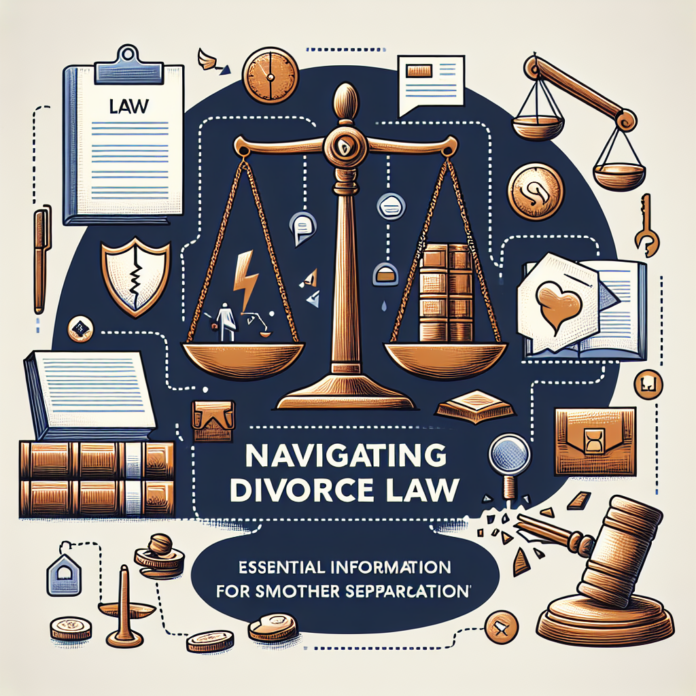Navigating Divorce Law: Essential Information for a Smoother Separation
Divorce can be one of the most challenging experiences in life, and understanding divorce law is essential for navigating this complex process. Whether you’re facing a contested divorce or considering a more amicable route like divorce mediation, knowing your rights and options can make all the difference. In this post, we’ll break down key aspects of divorce law, including the division of assets, child custody arrangements, and spousal support, giving you the clarity you need for a smoother separation. Let’s dive in and empower you with the knowledge to take control of your situation.
Understanding Divorce Law
Divorce law encompasses a range of legal issues that arise during the dissolution of a marriage. This includes the division of marital property, child custody arrangements, spousal support, and more. Understanding these components is vital for anyone navigating the divorce process.
One common misconception is that all divorces are contentious and require court intervention. In reality, many couples opt for uncontested divorces, where both parties agree on key issues such as asset division and child custody. This approach can save time and reduce emotional strain, but it requires clear communication and mutual cooperation.
Key Legal Terms to Know
Familiarity with specific legal terms can significantly ease the divorce process. For example, equitable distribution refers to the fair division of marital assets based on various factors like income and contributions to the marriage. Meanwhile, spousal support or alimony is financial assistance awarded to one spouse during or after divorce proceedings.
- Equitable Distribution
- Spousal Support (Alimony)
- Child Custody
- Legal Separation
Legal separation allows couples to live apart while remaining legally married. This option might suit those who need time apart without finalizing a divorce but still want to address financial responsibilities or child custody arrangements.
Differences Between Contested and Uncontested Divorces
Contested divorce involves disagreements between spouses regarding critical issues like asset division or child custody, often leading to litigation. In contrast, an uncontested divorce allows both parties to reach agreements without court intervention.
For instance, in a recent case where a couple opted for an uncontested divorce after agreeing on asset distribution and child visitation schedules, they completed the process in just three months compared to over a year for many contested cases.
It's crucial to recognize that while an uncontested divorce may seem straightforward, it still requires careful consideration of all agreements made—especially regarding children and shared assets—to avoid future disputes.
The Divorce Process
Navigating the divorce process can feel overwhelming, especially when emotions run high. Understanding the sequence of events and what to expect can mitigate some of that stress. The process generally begins with one spouse filing a petition for divorce, which outlines the reasons for the separation and any requests regarding child custody, support, and property division.
Step-by-step guide through the divorce process
After filing the initial paperwork, there are several key steps involved. First, the other spouse needs to be served with divorce papers, which formally notifies them of the proceedings. This can lead to either an agreement on key issues or disputes that may require court intervention. If both parties agree on terms such as asset division or child custody, they may proceed with an uncontested divorce. If disagreements arise, mediation or court hearings are often necessary.
- Filing a petition for divorce
- Serving papers to your spouse
- Negotiating terms (uncontested) or going to court (contested)
- Finalizing the divorce settlement
Mediation can offer a less adversarial route and is worth considering if disputes arise.
Filing for divorce: what to expect
When you file for divorce, it’s essential to be prepared for potential delays and complications. Each state has its own requirements regarding waiting periods and paperwork, which can significantly influence how quickly you finalize your separation. For instance, some states mandate a waiting period before granting a divorce decree regardless of whether it’s contested or uncontested.
It's also critical to gather all necessary documentation ahead of time—this includes financial records like tax returns and bank statements—as these will be needed during negotiations or court hearings.
Timeline for divorce proceedings
The timeline for completing a divorce varies widely based on numerous factors such as whether it's contested or uncontested and how quickly both parties reach agreements on key issues. An uncontested divorce might take as little as six weeks in some states if all paperwork is in order; however, contested divorces can extend into months or even years if litigation becomes necessary.
For example, one couple I worked with took nearly two years to finalize their contested divorce due to ongoing disputes over child custody and asset division. Each court appearance added months of waiting time between hearings.
Understanding that these timelines are not fixed is crucial; each case has unique complexities that will affect how long it takes to resolve everything from child support agreements to alimony arrangements.
Division of Assets
The division of assets during a divorce is one of the most contentious aspects of the process. Understanding how assets are categorized can significantly influence the outcome. Marital property, which is generally subject to division, includes anything acquired during the marriage, while separate property typically consists of assets owned before marriage or received as gifts or inheritances.
Marital vs. Separate Property Explained
Marital property is not just what you might think; it can also encompass income generated during the marriage and any increases in value of separate property. For example, if one spouse owned a house before marriage and its value increased due to renovations made during the marriage, that appreciation might be considered marital property. Conversely, understanding what constitutes separate property helps protect those assets from division.
- Assets acquired during the marriage are usually marital property.
- Gifts and inheritances received by one spouse are typically considered separate property.
- Debts incurred during the marriage may also be classified as marital debts.
Recognizing these distinctions is crucial for effective negotiation.
Equitable Distribution vs. Community Property States
Equitable distribution means that assets are divided fairly but not necessarily equally based on various factors like length of marriage and economic circumstances. In contrast, community property states enforce a strict 50/50 split of all marital assets acquired during the marriage. This fundamental difference can affect how negotiations unfold.
'For instance, a couple in California (a community property state) may find that all their joint earnings and purchases must be split down the middle regardless of individual contributions. In contrast, in New York (an equitable distribution state), one spouse could receive a larger portion if they were the primary breadwinner or contributed more significantly to family expenses.
Factors Influencing Asset Division
Several factors influence how courts divide assets beyond just state laws. These include each spouse's financial situation post-divorce, contributions to the household (both financial and non-financial), and future earning potential. Courts often consider if one spouse has been out of the workforce for an extended period due to child-rearing responsibilities when deciding on asset allocation.
For example, in cases where one partner has sacrificed career advancement for homemaking duties while raising children, they may receive a larger share of marital assets as compensation for lost opportunities in their career.
It’s critical to approach asset division with an understanding of your rights and potential outcomes based on your unique circumstances.
Misunderstandings about asset division can lead to costly mistakes. Many individuals assume that simply splitting everything down the middle will suffice; however, this approach often overlooks individual contributions and future needs.
Child Custody Arrangements
Child custody arrangements are often one of the most emotionally charged aspects of divorce law. Understanding the distinction between legal and physical custody is crucial for parents navigating these waters. Legal custody refers to the right to make significant decisions regarding the child's upbringing, including education, healthcare, and religious instruction. Physical custody, on the other hand, pertains to where the child resides.
Types of Custody: Legal vs. Physical Custody
When it comes to custody arrangements, parents can pursue joint or sole custody. Joint legal custody allows both parents to share in decision-making responsibilities, while sole legal custody grants one parent full authority over these decisions. Similarly, joint physical custody means the child splits time between both parents' homes, whereas sole physical custody designates one parent as the primary caregiver.
- Joint Legal Custody: Both parents share decision-making rights.
- Sole Legal Custody: One parent has exclusive decision-making authority.
- Joint Physical Custody: Child resides with each parent for substantial time.
- Sole Physical Custody: Child primarily lives with one parent.
Understanding these types of custody is essential for negotiating parenting plans.
Best Interests of the Child Standard
Best interests of the child is a guiding principle in determining custody arrangements. Courts prioritize factors that ensure children's safety and emotional well-being. This standard encompasses a range of considerations including the child's age, health, emotional ties with each parent, and each parent's ability to provide for the child's needs.
– A common misunderstanding is that a child's preference alone will dictate custody decisions. While a child's wishes can be taken into account—especially as they grow older—the court will ultimately decide based on what best serves their overall welfare.
Common Custody Arrangements in Practice
In practice, many families opt for shared parenting plans that provide structured visitation schedules. These arrangements can significantly reduce conflict by establishing clear expectations around parenting time and responsibilities. For example, a typical arrangement might split weekdays with one parent and weekends with another or alternate holidays to ensure both parents remain actively involved in their child's life.
While collaborative divorce approaches aim to keep communication open and amicable during negotiations over child custody, they can sometimes falter if one party becomes uncooperative or if underlying tensions resurface during discussions about parenting responsibilities.
Maintaining flexibility within parenting plans often leads to better outcomes for children.
Ultimately, successful child custody arrangements hinge on cooperation between parents and a clear focus on what benefits their children most. Misunderstandings about parental rights can lead to drawn-out disputes that further complicate an already difficult situation.
Spousal Support (Alimony)
Spousal support, commonly known as alimony, plays a critical role in divorce law, particularly for lower-earning spouses or those who have taken time off work to care for children. The aim of alimony is to provide financial assistance to help the recipient maintain a standard of living close to what they had during the marriage. Courts often have discretion in determining the amount and duration of support, which can lead to significant variability based on individual circumstances.
Types of Spousal Support: Temporary vs. Permanent
There are generally two types of spousal support: temporary and permanent. Temporary spousal support is awarded during divorce proceedings and is meant to provide short-term financial relief while the divorce is being finalized. Permanent spousal support, on the other hand, may be granted after the conclusion of a divorce and can last for an extended period, sometimes until the recipient remarries or one spouse passes away.
A practical insight into these types is understanding that temporary support can be modified if circumstances change—like a job loss—while permanent support may require more rigorous proof of need or change in circumstances to adjust.
Factors Courts Consider When Awarding Alimony
When determining alimony, courts evaluate several factors including the length of the marriage, each spouse's financial situation, age, health, and contributions made during the marriage. For instance, if one spouse has been out of the workforce for many years due to child-rearing responsibilities while the other has advanced their career significantly, this imbalance will weigh heavily in court decisions.
- Length of marriage
- Financial resources of both spouses
- Standard of living established during the marriage
- Contributions to marital property or career sacrifices
Remember that courts often aim for fairness rather than strict equality when considering these factors.
Real-Life Examples of Spousal Support Cases
In one case involving a couple married for over 15 years with two children, the court awarded permanent spousal support to the wife who had been a stay-at-home parent. The husband’s substantial income allowed him to cover both child support and alimony without financial hardship. This decision reflected not only their shared history but also acknowledged her sacrifices during their marriage.
Another case involved a shorter marriage where both spouses were employed full-time but one earned significantly more than the other. The court decided on temporary spousal support for one year while allowing time for job retraining and adjustment without placing undue financial strain on either party.
Many misunderstandings surround spousal support; individuals frequently assume it will be automatically granted without considering their specific circumstances or state laws governing alimony. It's essential not only to understand your rights but also how various factors apply uniquely in your case.
Mediation and Alternative Dispute Resolution
Mediation presents a viable alternative to traditional divorce litigation, allowing couples to negotiate their separation in a more collaborative environment. Unlike the often adversarial nature of courtroom proceedings, mediation focuses on facilitating communication between parties to reach mutually beneficial agreements. This approach can be especially advantageous in cases involving child custody, where maintaining a cooperative relationship is crucial for co-parenting.
Benefits of Mediation in Divorce Cases
One major benefit of mediation is cost efficiency. Legal fees can accumulate quickly in contested divorces, whereas mediation typically involves lower overall costs since it reduces the need for extensive legal representation and court appearances. Additionally, mediation allows couples to maintain control over the outcomes rather than leaving decisions up to a judge, which can lead to more satisfactory resolutions tailored to their unique circumstances.
- Cost-effective compared to traditional litigation
- Greater control over decisions and outcomes
- Less emotional strain due to collaborative nature
How Mediation Works in Practice
In practice, mediation involves both parties meeting with a neutral mediator who guides discussions around key issues such as asset division, child custody arrangements, and alimony. The mediator's role is not to make decisions but to facilitate dialogue and help identify common ground. Typically, sessions are structured and may require multiple meetings before reaching an agreement.
Mediation can significantly reduce the time needed to finalize divorce settlements.
[For example], a couple may enter mediation with unresolved disputes about shared property. Through guided discussions with their mediator, they might agree on a fair division that reflects both parties' contributions rather than prolonging conflict through court hearings. This not only expedites the process but also fosters healthier communication moving forward.
Comparing Mediation with Traditional Litigation
[When comparing mediation with traditional litigation], it's essential to recognize that while mediation promotes collaboration, it requires both parties' willingness to engage honestly and constructively. If one party is uncooperative or unwilling to compromise, mediation may not yield effective results. In contrast, litigation can sometimes feel like an easier option for those who prefer a more structured approach or lack trust in their spouse's willingness to negotiate fairly.
Ultimately, while mediation offers numerous benefits—including cost savings and greater control—it may not be suitable for every couple. Those facing high-conflict situations or serious power imbalances may find that traditional litigation is necessary for protecting their interests. Understanding these dynamics will help individuals make informed decisions about which path aligns best with their specific circumstances.
Emotional Aspects of Divorce
Divorce is not just a legal process; it’s an emotional upheaval that can leave individuals feeling lost and overwhelmed. Many underestimate the toll that divorce takes on mental health, often leading to anxiety, depression, and a sense of isolation. Recognizing these emotional challenges is essential for anyone navigating divorce law.
One common pitfall is the tendency to suppress emotions in favor of focusing solely on legal matters. This can be detrimental. For instance, someone might prioritize negotiating a divorce settlement while neglecting their emotional well-being, which could manifest later in poor decision-making or strained relationships with children or co-parents.
Coping Strategies for Emotional Well-Being During a Divorce
Effective coping strategies can significantly improve one’s emotional state during divorce proceedings. Engaging in regular physical activity, establishing a support network of friends and family, and considering therapy are all beneficial approaches. For example, joining a local support group can provide validation and shared experiences that help individuals feel less alone.
- Maintain physical health through exercise.
- Seek therapy to address emotional challenges.
- Join support groups for shared experiences.
Prioritizing mental health is crucial for effective decision-making during the divorce process.
Resources for Support: Therapy and Support Groups
Support resources are plentiful but often underutilized. Professional therapy can offer tailored coping mechanisms, while support groups provide communal understanding. For example, many communities have organizations specifically designed for those going through divorce, offering workshops and peer-led discussions that foster healing.
A key realization is that seeking help is not a sign of weakness; rather, it demonstrates an awareness of one’s needs during this tumultuous time. Individuals often overlook this necessity until they find themselves overwhelmed by unresolved feelings.
How to Communicate Effectively with Your Ex-Partner
- Use neutral language in communications.
- Set boundaries regarding topics of discussion.
- Focus on child-related matters if applicable.
Effective communication lays the groundwork for cooperative co-parenting.
Ultimately, understanding the emotional dimensions of divorce law enables individuals to navigate their situations more effectively. Ignoring these aspects can lead to prolonged distress and hinder progress through legal processes.
Legal Resources and Support
Accessing the right legal resources can significantly impact the outcome of your divorce proceedings. A qualified family law attorney is essential not just for navigating divorce law but also for ensuring that your rights and interests are adequately represented. Choosing an attorney with specific experience in divorce cases, especially those involving complex issues like child custody or high-net-worth assets, can make a substantial difference in how effectively you navigate the process.
Finding a qualified family law attorney
When searching for a family law attorney, it’s imperative to look beyond just credentials. Consider their experience with cases similar to yours, their approach to mediation versus litigation, and their communication style. For example, if you seek an uncontested divorce, finding a lawyer who specializes in collaborative divorce processes may be beneficial. A good attorney will not only guide you through the legal maze but also help frame discussions around sensitive issues like visitation rights or alimony.
- Check online reviews and testimonials from previous clients.
- Schedule initial consultations to assess compatibility.
- Ask about their approach to negotiation and conflict resolution.
Online resources for understanding divorce law
HBSLawFirm.com provides a wealth of information on divorce law tailored to various needs. From articles explaining key legal terms to guides on filing procedures and timelines, online platforms can serve as valuable starting points. However, while these resources are informative, they should not replace personalized legal advice. The nuances of your situation require professional insight that general information cannot provide.
[HBSLawFirm.com] offers comprehensive articles that break down complex topics into digestible pieces.
Local organizations that offer assistance during divorce
— Many communities have local organizations dedicated to supporting individuals going through divorce. These might include non-profits offering free legal advice clinics or support groups where individuals can share experiences and coping strategies. For instance, organizations like the American Bar Association sometimes host events where lawyers volunteer their time to provide pro bono consultations for those facing financial hardships.









